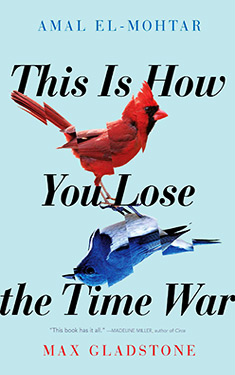Amal El-Mohtar and Max Gladstone
Completed 5/4/2021, Reviewed 5/4/2021
2 stars
I found this one of the most difficult books I’ve ever read. The prose is sumptuous but so distracting I couldn’t follow the razor thin plot, the voices are nearly indistinguishable, and the love affair is unbelievable. It’s only a novella, about two hundred pages, but it took me about three days to read. You can’t read it quickly because you might miss something amidst all the flowery word choices. It’s an epistolary story, with letters being written between two people. I somehow was expecting a better book considering the high average ratings it has on different review websites, including Worlds Without End. And somehow, it won both the Hugo and Nebula for Novella. I just didn’t really get it, no matter how many times I read the summary description of the story.
So, from what I gather from the summary and what I read, there are two factions that are warring each other by traveling back in time to made and unmake changes to alter the future. Each faction has a premier operative, known to us and each other as Red and Blue. Blue seems to be the one trying to change the future and Red seems to be going back to try to set it straight. The two begin leaving messages for each other in fruit, on feathers, and on other strange media, first taunting each other, then slowly falling in love. But if their superiors find out, it would mean death as traitors.
As far as plot goes, there’s hardly any. It’s a time travel story but there is no description of how it’s accomplished and there are no clear jumps to the past. The story just starts referencing a past “braid”. There are references to past historical figures like Genghis Kahn and Julius Caesar. There are situations where people are killed or not killed, or perhaps have something change in their lives which will change the future. And then there’s the love affair. Red and Blue fall in love with each other, somehow, through their very bizarre communication methods. How they figure out what the methods are was beyond me. The affair leads to a dramatic conclusion, but even that is littered with such overdone prose that it was hard to figure out what was going on.
Yes, the overdone prose. It was so distracting, but it was beautiful. It didn’t seem pretentious, just really well-done, but overdone. Particularly, at the end, it was several pages of glorious prose that didn’t go anywhere. I liked reading it, but I couldn’t read it quickly, lest I miss where some plot actually happened.
I thought the characterization was pretty non-existent. It felt like there was no difference between Red and Blue. Even the third person narration in between the letters sounded the same as Red and Blue. There wasn’t much description of either character, physically or emotionally. And their only growth was that they fell in love through their letters to each other.
I give this book two stars out of five, instead of one star, because of the prose. But I disliked everything else. It was actually hard to believe that two writers wrote this book, as it all seemed to be identical in style. I’ve read some Max Gladstone before, Full Fathom Five, and found it good but not great. I have not read El-Mohtar before, but her forte seems to be poetry, which is evident in this book. I’m not sold on either one yet, but I’d be willing to give them another chance.

No comments:
Post a Comment